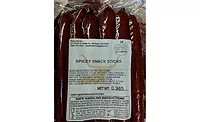Flame Pasteurizing ‘Sizzles’ for Ready-to-Eat Meats
To achieve the needed food safety and cooking efficiencies, many meat and poultry items such as hams, turkeys and chickens are today cooked in a pouch or bag, using water or steam, and then chilled. However, when processors need to add color, texture or flavorful seasonings to these items in order to satisfy consumers’ taste preferences, additional post-processing steps are required. The question is: What is the best way to attain those desired effects and also maintain extended shelf life?
The answer for many processors today is a breakout technology that can roast, flavor, sear and color meat and poultry while also providing the needed surface pasteurization to significantly extend shelf life—the “tunnel of fire” pasteurizing and flash roasting system.
 Using the flame tunnel, processors simply take the cooked and chilled whole poultry or meat products from the chiller and place them on a belt that moves the products through an enclosed flame that will color, sear and surface-pasteurize the products so that they are ready for immediate packaging. Because of the speed of the process—normally 30 to 60 seconds—complete surface pasteurizing and searing is achieved, yield loss is minimal and a long shelf life is ensured.
Using the flame tunnel, processors simply take the cooked and chilled whole poultry or meat products from the chiller and place them on a belt that moves the products through an enclosed flame that will color, sear and surface-pasteurize the products so that they are ready for immediate packaging. Because of the speed of the process—normally 30 to 60 seconds—complete surface pasteurizing and searing is achieved, yield loss is minimal and a long shelf life is ensured.
Flame tunnels such as Unitherm Food Systems’ Tunnel of Fire also include a dispensing unit that sprays browning and flavoring agents such as liquid smoke or other seasonings onto products as they enter the tunnel. This allows the color, texture and flavor of delectable products such as barbeque rotisserie-style chickens and honey-roast hams to be easily and consistently controlled.
Using this flash roasting and pasteurizing process, finished products maintain their cool core temperatures, and can be immediately packaged for distribution. This eliminates food safety problems that can occur when products are cooled in the open air prior to packaging, which exposes them to cross contamination that can limit shelf life to a few days rather than weeks.
Shelf Life of 40+ Days
Roasted chicken, a perennial favorite all over the world, provides a good example of how the right flame roasting and pasteurizing process and equipment can meet customers’ taste preferences while also extending shelf life.
Comercializadora Andina SA (Comansa) of Santiago, Chile produces a line of foods sold to supermarkets, including chicken, beef and other meats, plus a ready meal line that is mainly provided for the Chilean School Feeding Program.
One of the company’s primary products is roasted chicken, which is sold to supermarkets throughout the country at the rate of about 80,000 units per month. Eduardo Carvajal, Comansa Operations Manager, says that providing these chickens in a rotisserie style and an assortment of seasonings has enhanced sales and also offers other benefits.
“We cook the chicken in bags in a steam tank for about three hours, then chill it in the same unit,” he explains. “Afterwards we put the chicken through the Unitherm Tunnel of Fire to keep surface pasteurizing, and get the color and develop the seasonings. This is all done in just 30 to 35 seconds.”
Carvajal says that using the flame tunnel provides important benefits besides the assurance that each chicken is exposed to the air for only seconds before it is surface pasteurized and put in retain bags immediately afterwards, ensuring that it will remain safe.
“The coloring process of the flame tunnel is very important because our customers prefer that finish rather than a plain white color,” he explains. “Also, the same equipment enables us to provide a variety of seasonings, including spicy, barbeque, butter and sweet flavors.”
One of the most important benefits of the flame pasteurizing process is the extended product shelf life. While many roasted chickens have a typical shelf life of about 3 days, Carvajal’s is considerably longer.
“After we ship the chicken, we are certain of a shelf life of 42 days,” Carvajal says, “and that is an important reflection of our high standards.”
Speeding Throughput
Luka Meats (Luka Vleeswarenfabriek NV), Vilvoorde, Belgium, has offered an elegant variety of cooked hams, including smoked, roasted and extra lean hams as well as Strasbourg meat loaves, since 1970.
Until recently, the hams and Strasbourg loaves were pasteurized, browned and seared by hand, using a hand-held torch, but handling 1,200 hams and 300–400 loafs per week was just too time consuming.
“We used to spend an average of two hours a day finishing these products by hand,” says Thomas Leemans, Luka Meats founder and owner.
Recently, Luka Meats automated its pasteurizing process with a Unitherm Tunnel of Fire flash roasting system.
“This new equipment makes quite a difference in productivity,” Leemans explains. “We now save approximately 60 percent of the time it used to require to brand our products by hand, as well as considerable labor.”
For more information, contact Unitherm Food Systems, 502 Industrial Road, Bristow, OK 74010; Phone: 918-367-0197; Fax: 918-367-5440; email: unitherm@unithermfoodsystems.com; or visit the web site www.unithermfoodsystems.com.
Looking for quick answers on food safety topics?
Try Ask FSM, our new smart AI search tool.
Ask FSM →







